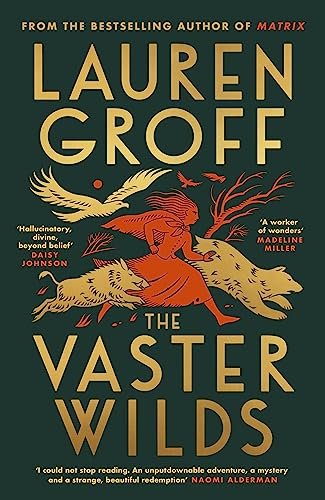It's striking when the mere act of reading a vividly written novel can provoke a physical reaction. Groff's new book is so atmospheric in its depiction of a spirited girl gradually starving while seeking shelter and running through a snowy forest that I felt the urge to wrap myself in a blanket while hoarding a provision of food. It's set in 17th century Virginia and follows the unnamed protagonist as she flees an English settlement after committing murder. The story of her life and reason for making this perilous journey into the unknown are gradually revealed as we follow the daily struggles she encounters while being subjected to the harsh elements of winter. Moments of reprieve when shelter or a bit of food are found feel all the more precious because she's so intensely vulnerable. While it charts her rapid physical deterioration it also captures her process of self discovery as she's experiencing the first true independence of her life. Having been born into impoverished circumstances and worked as a servant, she gradually forms a sense of self separate from the religious and social strictures she had to endure up until this point. It's a historical tale that has the tone of a timeless fable. I found it thoroughly absorbing, moving and breathtaking.
There are many stunning descriptions of the natural world throughout the story. Groff conveys the feeling of waking up to snow covered scenery, the chill of a freezing stream and the taste pine tea, but also the terror of rural night time when predators lurk. This is a season of desperate survival for every creature in this forest and the tragedies experienced by an enraged squirrel and sleeping ducks are also evocatively described. The author doesn't shy from bodily descriptions when conveying what starvation does to the girl's digestion or how fleas plague her. Though conditions in her present circumstances are dire, her life growing up in England and experiences in the colony were also horrifically perilous. She survived through a plague in her youth and starvation in the settlement where residents resorted to cannibalism. Even the journey to North America was fraught with danger and her memory of that stormy sea voyage is one of the most powerful scenes in the novel.
Though the girl had one good romantic relationship which she recalls as a precious memory, Groff also meaningfully describes her protagonist's sense of peril as a woman and alludes to how men have taken sexual advantage of her. She conveys how this is an ongoing experience any woman can relate to when she writes “For what woman has not, walking in the dark of the street or along a path deep in the countryside, sensed the brutal imaginings of a man watching her from his hidden place, and felt the same chills chasing over her skin, and quickened her steps to get away.” Though this is a historically set story, elements such as this indicate how some of the issues she experiences are timeless. She was once preyed upon by her mistress' odious son and his friends. The minister her mistress marries is terrifyingly sadistic. Life cast out in the wilderness may be fraught with danger, but so is being a penniless young woman in a male dominated society. Additionally, the girl possesses a natural intelligence and determined manner so it's sobering to think how if she'd been born into a different time period and circumstances she might have flourished.
In interviews Groff has described how she wanted to write a female version of “Robinson Crusoe”. It's effective in paying homage to Defoe's book because it's not only an adventurous tale of survival, but a philosophical journey towards a new understanding of oneself. Spending so much time on her own she develops her own language for the world around her “Naming, she understood, made things more visible” and contemplates a name for herself as “She thought sadly of all her own many names, none of them had ever felt fully hers: Lamentations Callat, Girl, Wench, Zed.” It's impactful how she gradually claims a sense of independent identity. Being so intensely alone she also starts to hear a voice which might be god, nature or a conversation with herself. Through this dialogue she becomes attuned to how she can shrug off inherited notions of the social and cultural order to reclaim and recast the world around her. Yet, at the same time, there's the question of whether life is worth living if you're not part of a community and connected with other people.
Though the story is centred on her perspective, the narrative occasionally shifts to other points of view such as the native Powhatan tribe who observe her from afar or other individuals who form a hermit existence in this wilderness. This broadens the novel into a larger story of how history is made up of many people who fought for survival – some who thrived and some who faltered. It's effective how there are also brief flashes of an authorial viewpoint to describe circumstances the girl doesn't know about and supply some important context. This novel is the second in a proposed thematic trilogy about the uneasy progression of our society across centuries from different women's points of view. It's noted at one point in this novel that “empire has no pity and is never sated.” The first novel in this group was “Matrix” which similarly charted a woman's process of self discovery and sense of community, but in a very different context and different conclusions. I'm so intrigued to see how Groff continues this project, but her immersive and powerful writing is always such a pleasure to read.











